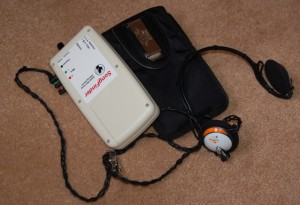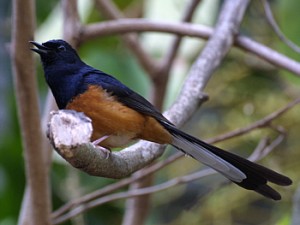SongFinder Review
I know I said I’d be gone for a couple more weeks, but that was before I got this great guest post by Mel Goff reviewing the SongFinder by Nature Sound Electronics, a device intended to help birders with high-frequency hearing loss. As I suffer a little bit from that malady already (and will likely suffer much more in years to come), this is a topic of great interest to me, and I hope others will benefit from Mel’s review.
One thing Mel wanted me to mention was that he has no vested interest in the product or the company; he just thinks this information needs to get out. With that, I’ll turn it over to him (and sign off again until March, as planned):
SongFinder Review
by Mel Goff
Background
I am 64 years old and have high frequency hearing loss. I spent 21 years in the US Army and the noise levels from computers, heavy equipment and weapons did me no favors. I have been birding with my wife, Jeanne, since a trip we took to the Everglades National Park in 2002. We make quite a team as she can hear the birds and I can do a pretty good job of spotting them. I tried all the latest and greatest hearing aids, and while they amplified the sounds that were within my frequency range, they did nothing to let me hear the sounds from the higher frequencies where the majority of birdies tweet. I could never justify the cost of those hearing aids when they did not do the one thing I wanted from them.
Then I saw an ad in the ABA’s “Birding” magazine for a product called SongFinder. It alluded to its ability to digitally convert high frequency sounds to lower frequencies thus enabling people like me to once again hear the birds.
Let’s Check It Out
With some optimism and much skepticism, Jeanne and I went into the home office and opened the Nature Sound Electronics webpage at www.nselec.com. I went from page to page reading about the frequency shifting technology, the testimonials, and the ordering information, until I finally came to the “Sound Samples” link. On this page there are pictures of 16 birds that I had long ago decided were mute. After all, I could hear a crow, so why couldn’t I hear a Yellow Warbler? I clicked first on that YW and a voice said “Yellow Warbler” followed by silence. Jeanne said, “Yep, that’s the Yellow Warbler.” Then the voice said “Divide by two”. Oh, my gosh, I heard it! It’s a trick! It cannot be!
We listened to all 16 with the song divided by 2, 3, and 4. Jeanne assured me that the “divide by 2” option was by far the closest to the real song. The others had the same pattern and cadence, but the lower pitch came off as less than satisfactory.
Let’s Give It a Tryout

Seeing that there was a 14-day refund policy, I decided to give the SongFinder a tryout. The only problem was that this was Monday, and we were leaving for Hawaii on Saturday. I called the company and I agreed to pay for FedEx second-day delivery. I got the unit on Friday afternoon, just 12 hours before we had to head for the airport.
On the plane I read the manual, then re-read the manual, then read it one more time. When we arrived in Lihue, Kauai, we had to get a rental car, buy groceries, drive to the resort, check-in, unpack – well, you get the picture. By now it was dark and the birds had retired for the evening.
The Big Day
Sunday morning, just after sunrise. We are dressed, we have our binocs and guides, and we head out to test the SongFinder for the first time.

At this point I want to tell you that the online demo did nothing to prepare me for the symphony of sound I would hear when we stepped into the resort parking lot. Cardinals (Northern and Red-crested), Japanese White-eyes, White-rumped Shamas, House Sparrows, House Finches, and Common Mynas all performed just for me. I could not believe what I was hearing! In fact, I decided to turn off the switch to see what would happen. When I did, all I could hear were the Zebra Doves, Spotted Doves, and Junglefowl that I had heard on our last visit to Kauai.
I am not ashamed to say that when I turned the power back on, I shed a tear or two as the concerto of songbirds once again came through the headphones. I was now finally a BIRDER, not just a Bird Watcher. For the next 16 days on Kauai, Maui, and Oahu, I heard the calls and songs of 76 species – seven of them lifers for Jeanne and me. The endemics: I’iwi, Apapane, Amakihi, and Maui Creeper at Hosmer Grove. The Japanese Bush-warbler on Lower Koke’e Road. The Bulbuls and Shamas at Lyon Arboretum. I cannot begin to describe the feelings I had.
The Good
The unit is easy to set up and use. It is lightweight, and clips to my belt. The size of the unit (4″ by 8″) did not bother me in the least. Adjustments for volume and frequency were easy to make. I used just the first 4 AA batteries I installed for the full 16 days and did not have to replace them even though I did have backups with me.
The SongFinder does not change any of the sounds I can already hear. I still hear the doves and crows and jays and flickers just as I did before. Their songs and calls do not come through the headset and are not altered. That is an important fact, because directionality will be mentioned in the next section and SongFinder does not affect that for the birds I just mentioned.
Herb at Nature Sound Electronics worked with me to get the unit delivered before I left, and even told me that if I had a problem with the unit, he would not be too strict on the 14 day policy since I told him our plans in advance.
The Bad
In actuality, there is no “Bad”, but there are a couple of things I should mention. Directionality is not a strength of SongFinder. It lets me hear the birds, but it is not Full Surround Sound Stereo that would let me pinpoint birds. Jeanne still helps me with that. Also, birds that are far away still sound far away. The unit is a frequency converter, not an amplifier.
I wear a large hat, size 7 & 7/8. The SongFinder headset is not adjustable like music headsets, so the one-size-fits-all idea is actually one-size-fits-most. It takes getting used to, but is something I gladly will adjust to. I plan to try to find a way to adjust the headset or see if the company has a larger model.
The cost may put off some folks. At $750 plus $15 shipping, you may think it is too expensive. But let me tell you that it is a small price to pay for the benefits you will receive. Digital hearing aids that will do nothing to let you hear the birds can cost five times as much.
Conclusion
SongFinder has changed my birding life. I can’t wait to get out in the mornings to hear the sounds of the winter birds. The chickadees, juncos, sparrows, finches, and Downies are beautiful to see, but even more beautiful when you can also hear them. I cannot speak to long-term reliability, but first results have been overwhelmingly positive. I wholeheartedly recommend SongFinder to any birder with high frequency hearing loss.
Please let me know if this review has helped you.
Good birding, everyone! I’ll be the one out there with the funny headset on listening to the birds again – for the first time.
— Mel Goff
2 thoughts on “SongFinder Review”
This is very encouraging, and the inventor Lang Elliot is one of my favorite nature recordists around. He suffered from hearing loss and this device was his attempt to recover what he had lost. Great review. Thank you.
Comments are closed.